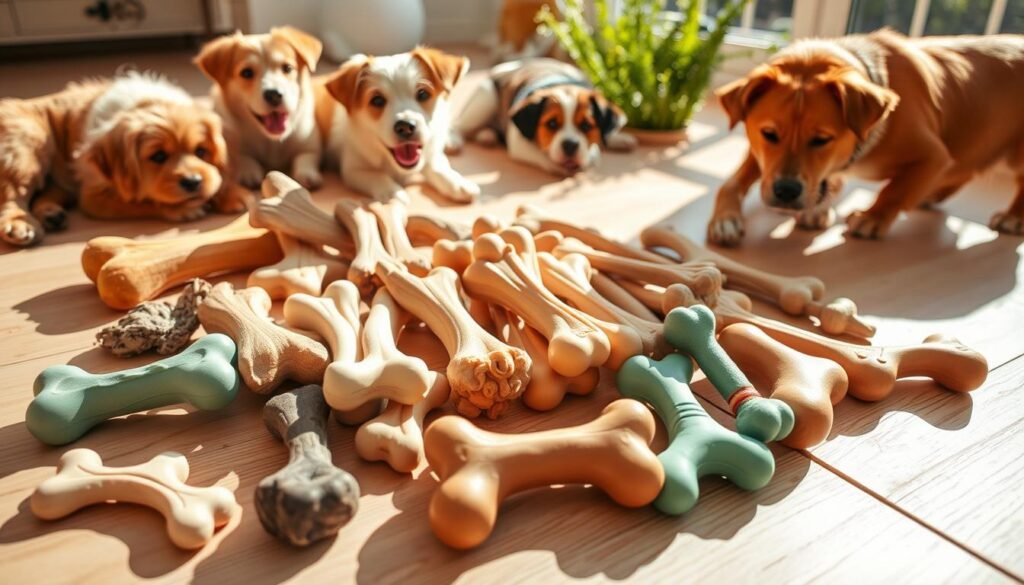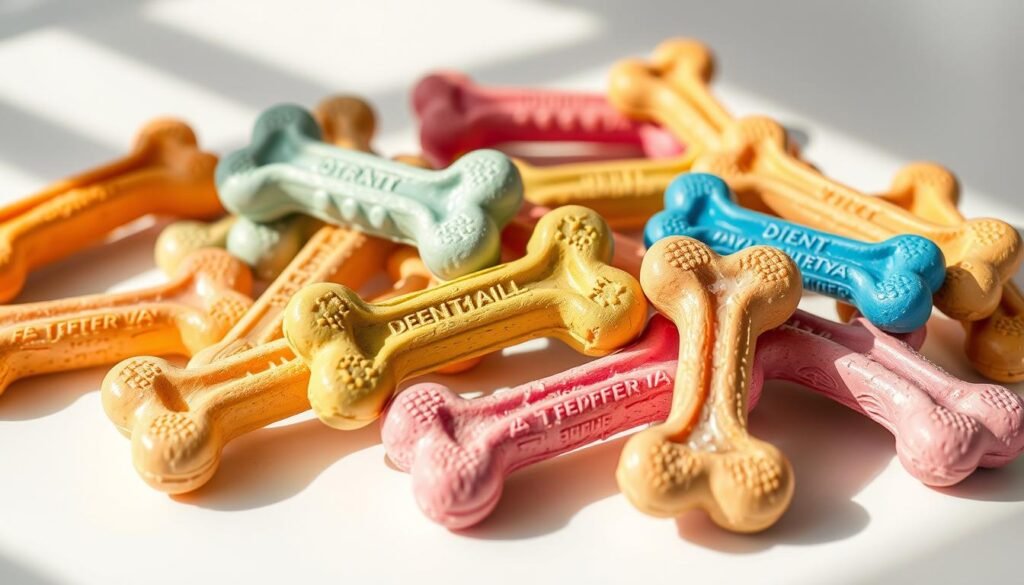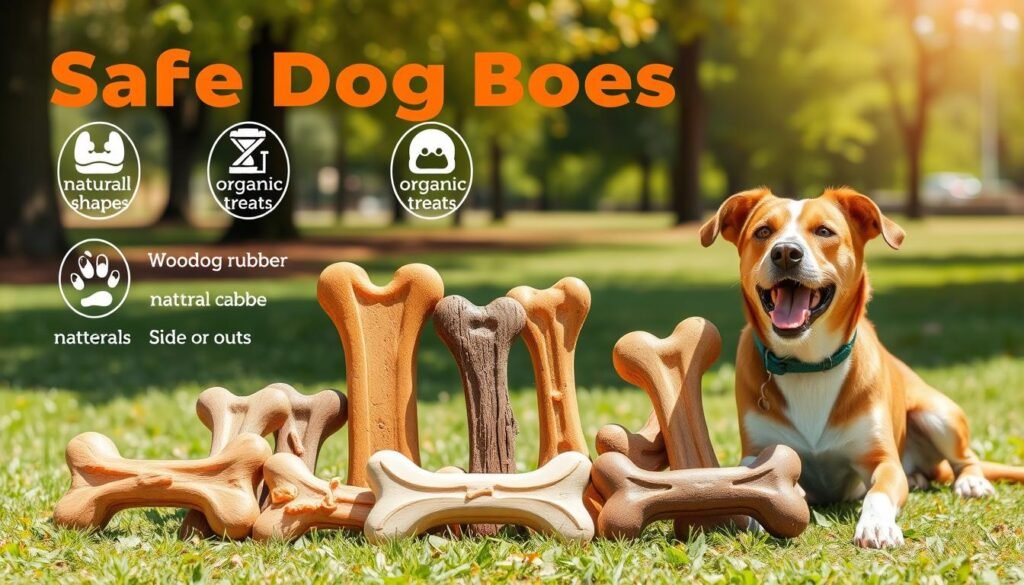
As a devoted dog parent, you might wonder, “What type of bones are the safest for my furry friend?” Choosing the right bones can be tough, but don’t worry. This guide will help you find the safest bones for your dog. We all want our dogs to chew naturally without risking their health.
Key Takeaways
- Dental disease is a leading cause of premature death in dogs, making proper dental care crucial.
- Raw bones from cows and bison are generally safe when used properly, providing essential nutrients.
- Cooked bones can become brittle and splinter, leading to injuries, so they should be avoided.
- Proper supervision and size-appropriate bones are essential to prevent choking hazards and other risks.
- Chewing on bones can help relieve teething pain and boredom in puppies and adult dogs.
Understanding the Natural Instinct: Why Dogs Need Bones
Dogs, being descendants of wild canines, have an instinct to eat bones. This is because their wolf ancestors needed bones for calcium and phosphorus. These nutrients are key for strong bones and teeth. So, our dogs still need long-lasting bones, chew toys, and healthy snacks.
The Evolutionary Connection
Even though dogs are domesticated, they still need to eat bones. This is because their digestive system and nutritional needs are similar to wild canines. Bones give them essential vitamins and minerals for health and happiness.
Benefits of Chewing for Dogs
- Keeps teeth clean and strong by scraping away plaque and tartar buildup
- Strengthens jaw muscles and promotes healthy gum development
- Satisfies the natural instinct to chew, reducing the risk of destructive behaviors
THE ULTIMATE DOG CHEW TREATS PACK for big furry families!
Mental Stimulation and Entertainment Value
Raw bones also provide mental and entertainment benefits. Chewing on bones challenges a dog’s problem-solving skills. It keeps them from getting bored and helps prevent bad behavior. Plus, it can calm them down and reduce stress.
| Benefit | Impact |
|---|---|
| Dental Health | Chewing on raw bones helps remove plaque and tartar, reducing the risk of dental problems. |
| Digestive Health | Raw bones can help regulate a dog’s digestive system, promoting regularity and preventing issues like stomach bloating. |
| Behavioral Enrichment | Providing dogs with long-lasting dog bones and durable dog chew toys can help satisfy their natural chewing instinct and prevent destructive behaviors. |
“Chewing on bones is an essential part of a dog’s natural behavior, and it offers countless benefits for their physical and mental well-being.”
THE ULTIMATE DOG CHEW TREATS PACK for big furry families!
Health Benefits and Risks of Dog Bones
Many pet owners are unsure about giving their dogs dental bones. But, these natural chews can be very good for dogs. They just need to be chosen with care to avoid risks.
Dogs chewing on dental dog bones helps prevent plaque and gum disease. It also keeps them mentally sharp and stops bad habits like scratching. Vets often suggest vet-recommended dog chews to keep teeth healthy and avoid expensive dental surgeries.
But, there are dangers in giving dogs bones to chew. Choking on bone pieces or getting hurt inside from sharp bones is a risk. Hard bones can also hurt a dog’s teeth, which can be very costly to fix.
| Pros of Providing Bones | Cons of Providing Bones |
|---|---|
| Promotes good dental health | Risk of dental injuries |
| Provides mental stimulation | Choking hazard |
| Offers some nutritional value | Potential digestive issues |
It’s important to pick trusted dog bones and watch your dog while they chew. Raw bones are safer than cooked ones because they don’t break apart easily. Also, there are safer options like synthetic chews and vet-approved dental treats.
By understanding the good and bad of dental bones, we can give our dogs a fun and healthy chewing experience. It’s a careful choice, but it’s worth it for our dogs’ happiness and health.
THE ULTIMATE DOG CHEW TREATS PACK for big furry families!

The Safest Dog Bones: What to Look For
Choosing the right dog bones is key for your pet’s health. Raw bones and processed bones have different benefits. Knowing what to look for can help you pick the best option for your dog.
Raw Bones vs. Processed Bones
Raw bones, like those from beef or lamb, are full of nutrients. They are great for your dog’s teeth and overall health. But, processed bones can break easily and are dangerous for your dog to swallow.
Size and Texture Considerations
The size and texture of the bone matter a lot. Big dogs need bigger bones to chew on safely. Small dogs should have softer bones to avoid injuries.
Veterinarian-Recommended Options
Vets suggest natural chews like dehydrated meat and antlers. These are safe and easy to digest. For dogs that chew a lot, synthetic bones and rubber toys are good choices.
THE ULTIMATE DOG CHEW TREATS PACK for big furry families!

By thinking about these points and talking to your vet, you can find the safest bones for your dog. This way, your dog can enjoy chewing without any risks.
Dangerous Bone Types to Avoid
Choosing the right trusted dog bones is key for our furry friends. It’s important to know which bones can be harmful. As a pet owner, I focus on keeping my dog safe and healthy. I’ve researched the dangerous bone types to avoid to ensure their well-being.
Cooked bones, especially from poultry, are a big risk. They can splinter and cause serious harm inside your dog. Pork bones and rib bones are also dangerous because they can break into sharp pieces. These can easily get stuck in your dog’s throat or digestive system.
- Cooked bones, especially from poultry, can splinter and cause internal injuries or digestive tract obstructions.
- Pork bones and rib bones are brittle and can break into sharp shards, increasing the risk of choking.
- Small bones that can be swallowed whole should also be avoided as they can block the airway or get stuck in the digestive system.
Some vet-recommended dog chews, like certain rawhide products, can also be risky. They might cause choking or blockages in the intestines. Always check with your vet to find the best healthy dog snacks for your dog’s size and needs.
THE ULTIMATE DOG CHEW TREATS PACK for big furry families!
It’s always safer to choose wisely when it comes to dog bones. By avoiding dangerous types and picking vet-recommended and trusted dog bones, you can ensure your dog has a fun and safe chewing experience.
Best Practices for Bone Safety and Supervision
As a responsible pet owner, keeping your dog safe is key. This includes using long-lasting dog bones, durable dog chew toys, or dental dog bones. It’s important to introduce them correctly, watch your dog closely, and replace them when needed.
Proper Introduction Methods
When introducing a new bone or chew toy, do it slowly. Start with a small piece and increase it as your dog gets used to it. This helps prevent choking or digestive problems.
Monitoring Guidelines
- Always supervise your dog during chew time to ensure their safety.
- Keep an eye out for signs of splintering or small pieces breaking off, which could pose a choking hazard.
- Monitor your dog’s chewing habits and replace any dental dog bones or chew toys that become too small to swallow whole or too hard, as they may damage your dog’s teeth.
When to Replace Bones
Check the bones or chew toys often and replace them when needed. Throw away any that crack, become brittle, or show excessive wear. Also, replace them if they get too small for your dog to swallow whole, as this is a choking risk.
By following these safety tips, you can make sure your dog enjoys chewing without health risks. Always put your dog’s safety first.
Conclusion
Choosing the safest dog bones is important. You need to think about size, texture, and your dog’s chewing habits. Raw bones from cows and bison can be good for your dog’s health and keep them busy.
But, you should avoid cooked bones, rawhide, and bones that break easily. These can harm your dog. Natural dog chews like yak chews and elk antler chews are safer and last longer for dogs that chew a lot.
When picking vet-recommended dog chews, remember your dog’s needs and size. Talk to your vet to find the best chew for your dog. This way, you’ll keep your dog’s teeth healthy, entertain them, and strengthen your bond.
